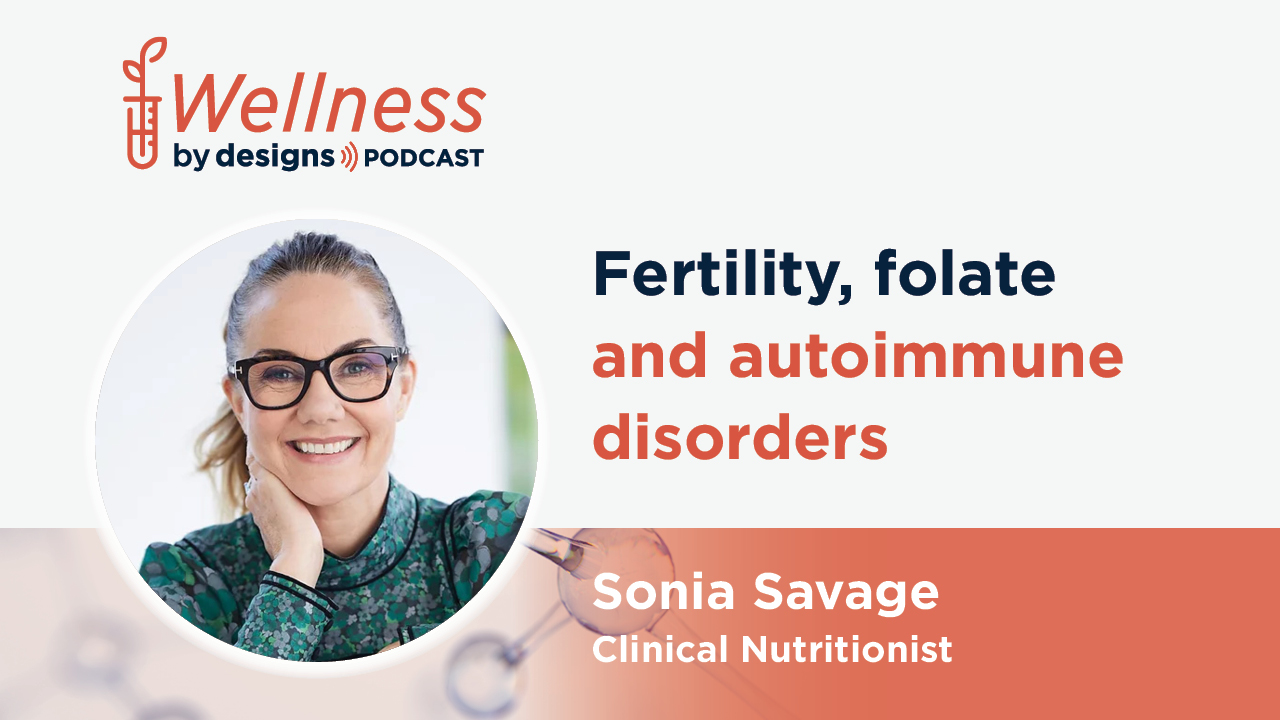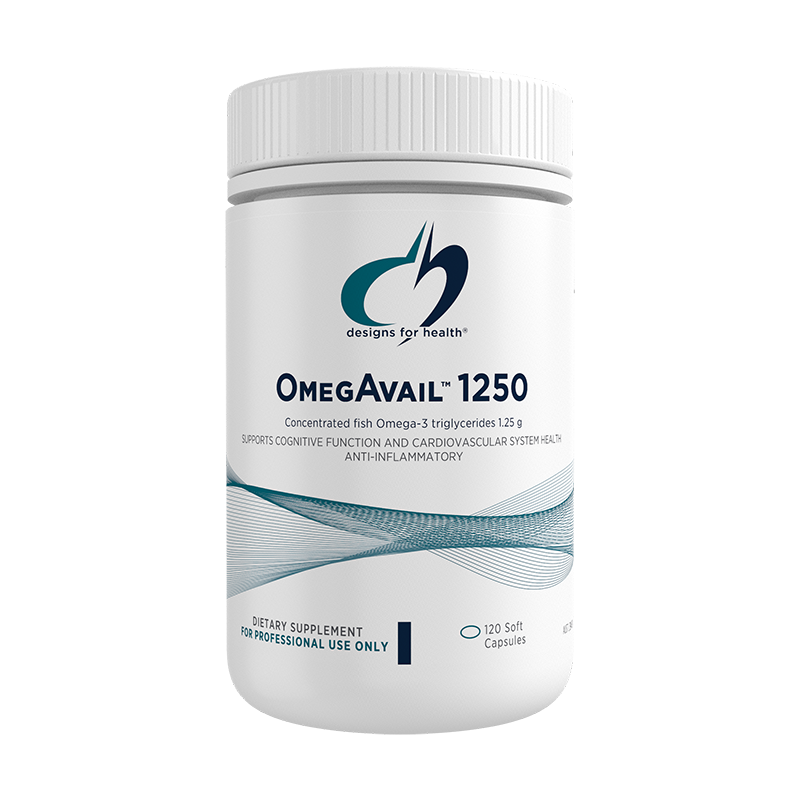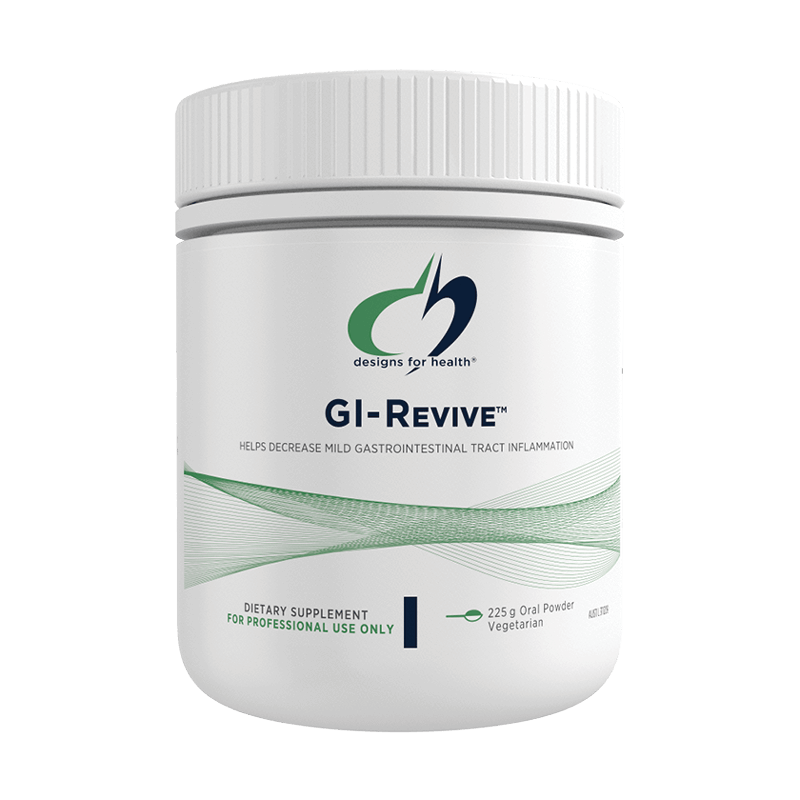
Joining us today is Sonia Savage, a clinical nutritionist specialising in fertility, hormones, autoimmunity, gut health, and children’s wellness.
Today’s episode discusses fertility, folate, and autoimmune disorders. But in particular, Sonia discusses
- Common autoimmune disorders seen in clinic and which autoimmune conditions affect fertility the most
- Autoimmune treatment, including diet, herbal medicine and lifestyle interventions
- The impact stress and toxicants play, particularly when considering thyroid antibodies
- Supplements to consider – including red flags, dosage and methylation impacts
About Sonia
Sonia has worked with Carolyn Ledowsky (founder of MTHFR Support) for the past 6 years, she also works part-time in her own practice Balanced Life Nutritional Therapy. Six years with MTHFR has given Sonia a specialised knowledge in the area of genetics and epigenetics and she has a keen interest in fertility, auto-immunity, gut health and children’s wellness. Sonia works with clients all over the world.
Having grown up just outside Tamworth, Sonia has a down-to-earth approach and appreciates that regional clients don’t always have access to the same range of food, supplements and healthcare services as city folk. She strives to support her clients wherever they are and whatever budget they are on.
Sonia had an early career in recruitment which she also thoroughly enjoyed, She owned her own boutique agency for 10 years before following her passion to help others on their wellness journey. Instead of career goals, she now discusses all manner of personal questions with her clients. Both jobs require mutual trust and asking lots of questions!
Sonia is based in the Northern Beaches and holds an Advanced Diploma in Nutritional Medicine from Nature Care College and a Bachelor of Health Science – Complementary Medicine (with Distinctions) from Charles Sturt.
Connect with Sonia
www.balancedlifenutrition.com.au
Follow us on Socials
Instagram: Designsforhealthaus
Facebook: Designsforhealthaus
Transcript
Introduction
Andrew: This is “Wellness by Designs,” and I’m your host, Andrew Whitfield-Cook. Joining us today is Sonia Savage, a clinical nutritionist. And today, we’re gonna be talking about fertility, folate, and autoimmune disorders. Welcome to “Wellness by Designs,” Sonia. How are you?
Sonia: Thanks, Andrew. Really pleased to be here. Thanks for having me.
Andrew: It’s great to have you on the show. Now, firstly, let’s just dive straight in. Tell us about what you love to treat in-clinic?
Sonia: Yeah. Thank you. So, I work between two clinics, so, Balanced Life Nutrition, and MTHFR Support, so I have a fairly broad range of clients that I really enjoy working with. But I guess my main areas are fertility, autoimmune, gut health, and probably children’s wellness, I guess, would be the main areas that I work within.
Andrew: Gotcha. And do you see children at both clinics, or do you tend to see them in your balanced health clinic?
Sonia: Yeah, I do see them between both, but I tend to do probably more at MTHFR, simply because I work with their parents, through fertility, and then I tend to work with the children, but probably, it’s probably evenly split, but I would say probably a little bit more of the children’s wellness at MTHFR, yeah.
Andrew: Gotcha. And what about autoimmune disease? Do you see both at both clinics, or do you tend to see them…
Sonia: Yeah, I see both at both clinics, and it is, you know, I was sort of looking at that this week, and I would say, you know, in a normal week, I would see probably 40%, 40% to 50% of the people I see would have some sort of autoimmune process. So, it’s quite a lot when I sat down and actually had a look at it. Yeah.
Andrew: And what about the type of disorders that you see? Like, you know, the flavor-of-the-month thing is Hashimoto’s, but there’s so many others. What about Graves? What about, you know, type 1 diabetes, for instance?
Sonia: Yeah. Yeah, totally. So, I had a 14-year-old yesterday who is showing positive auto-antibodies for Graves, which is, you know, quite young. I would say thyroid probably is the main component there in that, sort of, 40% to 50% range, but I also have a couple of, two clients, actually, I’m working with at the moment, for fertility with ulcerative colitis, so it is quite broad, but I would say, you know, thyroid, type 1 diabetes. I don’t have a lot of type 1 diabetes clients, but I have a couple of teenagers, and then I have a couple that I’ve been working with for fertility. And then, there’s the other, you know, celiac, you know, I would classify that as autoimmune, and also, yeah, as I just mentioned, ulcerative colitis, Crohn’s, that type of thing.
Andrew: Yeah. And what about the arthropathies? I stumbled over that word. Arthropathies. Do you see things like, for instance, juvenile idiopathic arthritis? Do you see, you know, rheumatoid arthritis, any of the other arthropathies?
Sonia: Yeah, I haven’t actually seen a lot in clinic, fortunately, I guess, rheumatoid arthritis. I tend to have clients coming to me who have a family history of rheumatoid arthritis, and then getting the achy knees and the, you know, and people trying to get in front of it, more so than coming after the diagnosis, which is fabulous. Like, so, parents might have had it, and then they’ll be bringing teenagers to me, to sort of say, okay, you know, please explain best diet so that they can try to potentially head it off at the pass as they get older. So, I don’t, haven’t actively, actually, worked with a lot of people with rheumatoid arthritis, but certainly, you know, trying to steer, sort of, younger teenagers, usually, away from that direction, mainly, I’ve seen in clinic, yeah.
Andrew: And when you’re dealing… Forgive me for cutting you off. Sorry.
Sonia: That’s okay.
Andrew: When you’re dealing with these parents who have autoimmune disorders, and then you’re dealing with their fertility issues, how much time do you have to spend on just reassuring them about, you know, genetics, and what their child is in for and things like that? Do you spend a lot of time counselling them?
Sonia: Yeah. And also not to, I guess, really…like, it’s important for the kids to not go through life thinking, “Well, that’s what’s going to happen.” Like, I guess, you know, and actually, at the weekend, I had two teenagers that I see, and both parents are doctors, so very well-informed. And the female parent does have Hashimoto’s, so she is, you know, she’s really mindful of testing the kids, and making sure. But right now, there’s no, nothing going on for those boys. And, but, you know, wisely, the teenagers are 14 and 16, and they’re working on explaining an anti-inflammatory diet. Their mum always says they actually listen when it’s me, they don’t listen when it’s her, which is normal teenage response.
But, you know, working with, from that angle, to try to say this doesn’t necessarily have to be your path. Diet, you know, really, really can make a huge difference, keeping stress down, keeping the toxins down, and just, I guess, reassuring everyone that, you know, it doesn’t have…and one autoimmune disease doesn’t have to morph into another, which we understand, you know, can be, unfortunately, what happens. They like to travel in pairs. So, I guess a win is trying to, you know, steer the next one off at the pass, yeah.
Andrew: Yeah. We’re jumping around a bit, because I was thinking in my mind about following this through chronologically, but it’s important things you’re mentioning. So, let’s jump to that teenage years. You mentioned stress.
Sonia: Yeah.
Andrew: A very stressful period of many people’s lives. So, how do you… I mean, let’s frame this up better. I’m getting the feeling that these kids are very well-informed, and I’ve actually spoken to kids with neuroatypical disorders, and I can’t believe how poised they are, how knowledgeable they are, and how settled they are, with their condition, how they’re treating it. I was blown away. Is that what you find most people are? Is that, like, a subset?
Sonia: Well, I think the people that, you know, come and see integrated practitioners are generally fairly, you know, well-informed, and that means they’ve…the kids are well-informed, and they can chat very openly about what’s going on, whether it be at school, whether it be to me, whether it be… And I just love that, because I don’t…I think this is a fairly new, you know, this next generation coming through can do that, like, you know, I’ll have kids that’ll say, you know, Sonia, it’s really, you know, going to the toilet’s really hurting again, or… You know, they’re just, they’re not embarrassed about it. Like, I just think that’s great, and probably coming from parents, coming from, potentially, you know, what they read in the media, but I agree.
And then there’s kids who, you know, just, and potentially parents, who just have been eating the wrong thing, are feeling terrible, but it’s just such a simple change. Like, teenagers and kids turn around way faster than, sort of, us older people do. Like, you can make a change, and within two weeks, they’re like, “I feel completely different.” And it’s just marvelous, because they really see the difference, and that’s, I love that in clinic, having the teenagers say, you know, “Sonia, I’m actually getting to bed on time because you told me I should be off my screens. I’m doing it, and now I’ve taken up soccer.” Or, “Now, you know, I’ve spoken to my parents about, you know, I really wanna do that subject at school,” or, I just, yeah, it’s really rewarding. But I do, going back to your question, I totally agree. The people that are certainly coming to me at MTHFR, I learn from them every day. Like, they are amazingly well-educated group of people, and I take something away from every consult that I have. They’ll teach me something. Like, it’s amazing. I love it. Yeah.
Andrew: Well, you know what? That’s actually the sign of a good practitioner.
Sonia: Oh, thanks, Andrew.
Andrew: So, kudos to you, Sonia.
Sonia: Yeah. And I share it with other people. I’ll go, “Do you mind? What was that? I’m gonna share that with my other clients.” And then I’ll say, “A client told me,” and I find that just a fabulous way to spread good information. Yeah.
Andrew: Yeah, absolutely. I have to ask about these kids with, you know, the changes that they feel, pretty quickly. And then you’ve got temptations. You’ve got birthday parties. You’ve got peer pressure. You’ve got the rejection syndrome that people have, you know. We see it very commonly with type 1 diabetes. So, do you find that because of their knowledge, they know how to pull themselves out? Or do they come back and go, “I fell off the wagon again?”
Sonia: I think it depends on which autoimmune process we’re looking at. So, obviously, there’ not much wiggle room at all with celiac. Like, that’s a line in the sand. There’s no, you know, when you go to someone’s party, you gotta take your own food. You know, so, and then there’s sort of sensitivities that, you know, you can use more the 80-20 rule. And, you know, I always say, “What you do every day matters more than what you do once in a while.” So, you know, we try to work out what is acceptable, so that they feel part of the peer group and so forth. And I do chat to them, “Okay, so if you’re going to this takeaway place, that you’re like, ‘The better choice is this.'” Like, I try to arm them with some information.
Type 1 diabetes, these days, fortunately, most of my clients would be using the intravenous monitor, so that, you know, it’s in, like, through the stomach? I’m not sure if that’s correct. But, you know, the 24-hour glucose monitor. So, it’s adjusting insulin these days. It’s not like the old days. So, my clients who are teenagers that wear those, still, gosh, the parents do a lot of legwork there. So, you know, they do often give their kids some freedom, as they should, but I think there’s a lot of responsibility till they sort of get to that, you know, 18, 19-year-old. So, there is some wriggle room with that, and then there’s others that I would say, you know, guys, for you to feel better, like, we’ve gotta absolutely, you know, hold the line with this.
But I think they feel so much better. And if you explain it to them of why we’re doing it, then I think they get it. And they might fall off a bit, but they’ll come back pretty fast, is my experience there.
Andrew: Yeah. I was very impressed by this young gentleman I met, newly diagnosed type 1 diabetic. And I was amazed. A teenage. And I was amazed at the confidence, and the, almost nonchalance. And he wasn’t denying it. He was accepting of it. But he was just like, “It is what it is.” And I was, he was so adult about it. I was taken aback. I was going, where was I at that age? Where was my life?
Sonia: Thanks goodness that he… Yeah, no, it’s amazing. And so mature. And I guess, you know, it’s just fabulous now that that is available. You know, it was really expensive when it first came in. And now it’s, you know, there’s more funding for it. And, you know, some more people can have one of those fantastic devices, so they’re not pricking their finger and checking their, you know, their glucose all the time. Like, I just, I think it’s fabulous for, that have more of a normal life. Yeah.
Andrew: So, let’s go further into diet, about, you know, starting people with changes. And when people have been molded into eating the wrong foods habitually, particularly over a long period of time. And I guess this is more evident in the older set, but, you know, you get family members that they eat at the dinner table, they’ve always eaten white food, the white bread’s always on the table, da, la, la. How easily do you find it’s able to change the life of one patient when the family don’t have that same condition?
Sonia: I think, when we’re talking about fertility, you get buy-in like you don’t get it at any other stage. It’s amazing what people do when we’re talking about the fertility journey. And it just impresses me how much people will change and stick with things. You know, and I do work with sort of more mature patients. You know, I’ve got, sort of, 70, 75-year old, one 79-year old patient. And generally speaking, their diet is pretty good. Like, you know, they’re sort of still making a lot of their own food, they have a little garden in the backyard. So, I think it’s probably more that sort of, you know, 40 to 50 range. I think by 50, people are starting to go, “Oh, I’m not feeling so good, so I better change things.” So, it’s probably like, I guess you’d say 25 to, you know, 45, let’s say, make a bit broader, where some changes… Not so much, I think, yeah, family’s got a lot to do with it.
But I think people get time-poor. They get tricked into thinking, “Oh, you know, you can just buy everything in a packet.” You look at the freezer and the chiller now in Woolies, like, you know, put your food in a plastic container and put it in the microwave, it takes three minutes, you get a nice, you know, serving of endocrine-disrupting toxins with your plastic. You get food that probably has no nutrition in it, but the health star rating, the marketing, like, it fools people into thinking that they are actually eating well. So, I think it’s definitely making that move. People are pretty well-educated these days, I think, but it’s trying to sort of go, well, here’s some things that you can do within 10 minutes, that don’t require… So, I try to say, “Yeah, you’re busy, you’ve got three kids, you’re working, but let’s get rid of,” as you say, “let’s get rid of the beige food, and I want four different colors on your plate. I want a minimum of three cups of veg a day.”
And I try not to, look, there’s certain clients that I’d work with quite specifically, for different conditions, especially bowel conditions, but in general, I’m always just saying, Mediterranean-style diet, lots of veggies, some good fat, good, quality protein, not too many grains, and if it’s a autoimmune process we’re trying to bring down, to go into a successful pregnancy, I’m really strict. So, I’m like, no grains, no gluten, minimal dairy. And I was just looking at one of my clients before who’d been trying for six years when she came to me, and she’d started trying at 28, so it wasn’t, you know, not, age didn’t have much to do with it, she’d been told the only way they’re gonna get pregnant is via IVF, and we got her thyroid autoantibodies down from 618 to 56, with diet. So, it became… And I’m now working with her for her second baby. And that was something that everyone, the doctors are sort of saying, “You’ll never get it down.” She did everything she had to do. We had to look at her partner and so forth, but I was just, I love seeing things like that because it’s there. Like, it shows. She changed her diet. The autoimmune markers came down. There’s no question. It’s there in black and white for anyone to see.
So, you see things like that, and my client with ulcerative colitis, she’s, fortunately, pregnant at the moment, after many years, and her gastroenterologist said the same thing. After the diet we’ve had her on, it’s the best she’s looked, you know. That was a two-months-ago appointment with him, and now, fortunately, she’s early days pregnant. So, I just see diet being so important, and it sort of depends on what we’re trying to achieve on how hard I’ll go with, “This is what we need to do, there’s no wriggle room,” or, “Yeah, look, this is where we’re at. There’s a bit of wriggle room,” so…
Andrew: Yeah, that’s right. And, you know, depending on the severity of the condition and how it’s affecting the patient, it’s really interesting. Hey, I’ll get, sometimes get people who say, you know, “Can I still have,” you know, “How much? I don’t wanna give up,” that sort of vernacular, and I say to them, “Well, for those who want much, much is expected,” you know? It depends how far you want to go healthy. If you want a little shift, go as you were going. But if you want, if you need to get better, you need to change, and if you’re not willing to change, there’s some issue here, you know, that you need to think about your mindset, sort of thing.
I was gonna say, isn’t it interesting about this narrative that we’re being fed now, and that’s these insidious, persistent chemicals that have never been seen on Earth, 40-odds thousand? Is there more? And now we’ve got this, “Aww. They’re forever chemicals.” “Aww. They’re like best friends forever.” Forever chemicals. So, it’s this real interesting change in somnolence, you know. “Just don’t worry about it. They’re forever. It’s okay.”
Sonia: Yeah. Yeah. One bite at a time. I always send them to Tabitha’s book. Please go and read the book and see what that’s going to…
Andrew: What is it, “One Bite at a Time: Eat the Life You Love,” or something?
Sonia: Yes. I think that’s right. It’s very good book. But, you know
Andrew: Yeah. Tabitha McIntosh and Sarah Lantz, everyone. Gotta put that in the footnotes.
Sonia: Yeah. Amazing. Mm.
Andrew: And what I love about what she says is that, you know, we can’t all afford, certainly in this economic situation we’re going through, we can’t all afford the lovely natural organic foods. That’s fine. But she talks about getting the organic buck, your organic wand, so there’s something. What’s gonna give you most bang for buck by changing to organic or clean, you know, or something, some change in your grocery list.
Sonia: That’s right.
Andrew: Really, it’s a brilliant book.
Sonia: That’s right. And it makes sense. Yeah. It makes sense. So, we’ve gotta try to get the best food chain you can afford. And that might be, you know, just going to the farmers’ markets. It might not be organic, but it only left the soil two days ago, whereas, you know, Woolies, it might have left the soil six months ago and tripped across the world, or done anything. And it starts to lose, you know, it starts to lose nutrients the minute it’s out of the ground. So it makes sense that if you want some nutrients, you’ve gotta get something that wasn’t, you know, in cold storage for six months. It just makes no sense.
Andrew: If you can. And we’re not just blaming Woolies. All supermarkets.
Sonia: No, that’s right. That’s right. And, you know, we, well, it’s not available to everyone, farmers’ markets. If you live in the country area, you know, that doesn’t happen like it does in the bigger cities. I totally get it.
Andrew: And I’ve said it before. This is probably the, one of the very few good things that’s come out of COVID, about growing, people growing some of their own foods, even if it’s a herb garden, something, that they can put on their table, that they can nurture, and see grow, and, you know, watch it. I think it’s really important for kids to do that as well.
Sonia: So important. Yeah, that’s really
Andrew: Now, the next thing we have to talk about is, and it sort of goes hand-in-hand with diet, and coming to see a naturopath, and somebody who’ll care and listen, and take some active sort of participation in their condition management, and that is stress management. So, how much weight do you put on stress management, particularly in autoimmune diseases?
Sonia: You know, I probably put it at the top. Yeah. I think it’s almost at the top. Like, I think your diet is a really great, you know, it helps you get through a lot of stress. But I think, you know, and we know in the methylation world, stress throws out methylation, no matter what supplements you’re having. So, I think…you know, and stress, you can’t avoid it. So we can’t all go and live, you know, in a retreat situation. But I think it’s part of your responsibility to your health to try to manage your stress. And that might be just by breathing, yoga, walking the dog, gardening, painting, whatever it is. But I think we have to identify, you’ve gotta learn how to switch your parasympathetic nervous system on, because I think it’s right up there, you can do, you know, especially around that, you know, with females and males, but around that sort of 38 to 45, like, if you’re gonna get something going on with your thyroid that you haven’t had before, that’s when it starts. And there’s a lot juggling at that time. And, you know, people might still be doing, you know, a lot of high-intensity running, or sport, they’ve got a job, they’ve got three, two or three children. Like, I think stress, even if you’re eating the best diet, is, it just brings, you know, it unravels things. So I think that that’s right up there. Like, I think diet and stress and sleep are probably the three main pillars of what you can do to really make a difference to your health. But I think it’s important. Yeah.
Andrew: Yeah. You were talking about the pre-made meals in the plastic container, which we conveniently microwave, and heat them up, and release them into the food. What other sort of toxicants are important in looking for, assessing, in your patients, with regards to both fertility and autoimmune?
Sonia: Yeah, sure. So, it depends on who comes to see me. But obviously, if the partner is landscape gardener, you know, or a tradie, or a farmer, you know, I’m starting to look at, you know, different sorts of chemicals, whether it be fertilizer or heavy metals. The patient that I mentioned to you before, that we got her thyroid [inaudible 00:23:43] antibodies down, we worked out her partner had a huge copper problem. And we balance that with zinc. But I would probably start with looking at, you know, zinc and copper, because it’s fairly easy, straightforward to do in bloods. If I have to get more into detox, I mean, mercury, obviously, if they’ve been eating a lot of fish… It depends on the timeframe. I always ask for everyone to give me three to four months before they try again. It sort of depends on, you know, where we’re at with that. But just generally, trying to get, like, as many of the chemicals out of your house as we can start with. So, you know, trying to swap to a natural deodorant, getting rid of the body products, the makeup. For the husband, making sure he’s not out the back spraying with Roundup, you know, over the weekend. If he is, he needs to wear his gloves and his mask and things like that.
So, I think as far as fertility goes, there’s a lot of chemicals that can cause problems. It sort of depends on what sort of timeframe we have to check. You know mercury in particular, there was that fantastic quicksilver tri-test that was available in Australia a few years ago, and that’s not… You know, so, it’s tricky to test and then treat it all, but I would just start to support detox vacation, and try to get rid of the chemicals that we know they’ve been kind of, you know, dealing with day-to-day. So, you know, the hair…the fluorocarbons and things from the spray, you know, the men with the spray deodorants, trying to get them to use one that, you know, will actually work. So, I just start there and then support detox. So, look at methylation, look at B12, look at folate, look at potentially NAC, or a small amount of glutathione, resveratrol, just antioxidants leading up to when they start to try. So, there can be… And I guess if they’ve come to me and there’s really, you know, there’s a lot of miscarriages and, you know, we might have to get into that way more before we start trying, which might mean more testing. Yeah.
Andrew: Gotcha. And, you know, we commonly consider detox to involve supplement, but what about things like infrared saunas, and dry brushing, and hydration, and, you know, all of that sort of thing? And I’m gonna be, and I don’t mean this in a creepy way, but it might very well come across that. But with males, what about things like, you know, increasing ejaculation while they’re not trying…while they’re clearing crap out of their body, to get rid of toxicants? Is that something? Is that a thing? Or am I just off?
Sonia: Yeah, I don’t actually, yeah, I don’t know about that, Andrew. I’ll have to research that one and come back to you.
Andrew: I’ve never researched. I just thought about getting things out. There’s a quick way.
Sonia: Yeah. I don’t know. Definitely the infrared saunas, you know, I’m always… So, I should get, take shares in City Cave, because I’m forever saying, “Go and get the trial at City Cave.” Some of my clients who come to me that are quite unwell, you know, with mold illness and things, I just have to, you know, I wouldn’t send them in for 45-minute sauna, you know, straight off the bat. But I think that’s great. And I sort of talk to them about going in there with their essential oils, you know, on a little piece of cotton wool or something, to, you know, to really don’t, you know, don’t get on your phone, use that time, bring this nervous system down, inhale some lavender, or, you know… And I think that that’s definitely a great way to go. Epsom salt baths are a great way to go. Body brushing’s a great way to go. And, as you said, most importantly, drinking enough, you know, filtered water, to wash out everything that, you know, people sometimes just aren’t drinking enough water. It can be as simple as that. So, definitely those detox, and then looking at, you know, liver enzymes. Are they up? Have they been up? Has there been a lot of pharmaceuticals? Is there a lot of pharmaceuticals that are, you know, the client’s taking? Those sorts of things, but certainly antioxidant support, pre, you know, during the preparation, the prep period, for both parties. Like, it’s a 50-50 deal. So, for the males and the females, really important.
Andrew: And is that where you start to maybe, if required, you know, add in some adaptogenic herbs for their stress? Like, do you look at that really early, or do you look at that later on if they need it?
Sonia: Yeah. So, I’m not a herbalist. So, I’m just clinical nutrition, but definitely…
Andrew: Forgive me.
Sonia: …some of the… Yeah, no, that’s okay. Some, and obviously, working at MTHFR, I would share client, like, I’d get help with that if needed. But I definitely would look at, you know, from my toolbox, I’d be looking at, you know, magnesium. Potentially even more than that if necessary, you know, things like 5-HTP, potentially SAM-e, if, you know, we really need to look at calming things down. And then, adaptogenic herbs would definitely be something that we may look at. And certainly, when it comes to the thyroid, we have a fabulous pre-conception autoimmune mix, that the girls make up, under, sort of, instruction from Carolyn Ledowsky. She would say, “Right, who are you working with? This is what we need.” And we would make that up on clinic. And I think that was one of the big reasons we were really able to get those thyroid antibodies down with diet. So, that was, you know, that was part of that. And that was, I wrote them down if you’d like to know…well, I wrote them down in case you asked me what was in them, Andrew. Do you want me to yell it out? So, echinacea…
Andrew: Yeah, yeah. As long as we don’t mention product names, that’s all.
Sonia: Oh, no, no. Hemidesmus, Rehmannia, ginkgo, and feverfew. Feverfew. So, that is what we would use as a autoimmune pre-conception mix, to bring, that helps bring down those autoimmune markers, and works really well. Yeah.
Andrew: Yeah, beautiful. And what about, you know, red flags that you have to look for, with regards to, say, I mean, I’m guilty of this too, heroic dosing. For instance, with methylation nutrients. What do you look for? Do you tend to question patients about “Have you noticed this?” or, you know, do you wait for them to say, “Hey, listen, I went off on that?”
Sonia: Yeah, “And I didn’t do well.” So, definitely the first point of call would be B12. So, look, if B12 is low, and you put in methylfolate, doesn’t matter what your genetics are. That might not go well at all for the patient. And then, obviously, just, because of the nature of the MTHF clinic anyway, I often have genetics, not all the genetics, but I often have MTHR, And these days, I often have COMP as well, which helps me make the decision on methylfolate. So, that kind of, that’s a little red flag to me, to say, “Oh, we’re gonna have to go carefully.” If they’ve got a lot going on with their gut methylfolate, like Candida and things, that can make the reaction not so great either.
So, I’d look at B12 first. And you can also do a little niacin trial. So, using niacin, sometimes I’ll just start with that and say, if I don’t have any genetics particularly, I might say, “Just take 250 milligrams of niacin, three or four times a day for two days, and tell me how you feel.” And if they tell me that makes them feel much better, I’d go really slowly with methylfolate, because that tells me there’s a block somewhere. Like, that tells me, because it made them feel better, it could not go well if I hit them with a huge amount of methylfolate.
Andrew: You said niacin. We need to be careful about which form. So, you’ve got the nicotinic acid form, which is the flushing form. And then you’ve got the niacin, or nicotinamide form, which doesn’t flush.
Sonia: That’s right.
Andrew: Which ones are you talking about?
Sonia: That’s all right. I would go… Look, the nicotinic acid isn’t necessarily going… But, like, people will think they’re having a heart attack, like, if they get the flush and they don’t know.
Sonia: Yeah. So, that’s not a good start. It’s not readily available, retail, in Australia, though, so unless they’ve bought it off iHerb or something, like, they’re usually not gonna have, get hold of that. And I always sort of put it in my notes to say, “If you’ve bought it off iHerb, do not do 250 milligrams of nicotinic acid, because it’s too high, and you’re going to think something terrible has happened.”
Andrew: Way.
Sonia: So, I normally just sort of say, if you’re getting it retaily, you’re gonna be fine, but just double-check you’re not using, yeah, nicotinic acid, because then, 50 milligrams would be, you know, more than enough, whereas… So, yeah. So, I’d normally say, you know, just use a brand. Look, there’s lots of brands that you can get retail, or on, you know…
Sonia: …practitioner. Yeah. And then, just try that. And sometimes, that, if they say, “I felt so much better,” when I’m introducing methylfolate, because, if we’re going down the fertility route, we’ve gotta get it in somewhere, or we might have to use folinic acid if we can’t get there. But, sometimes, they can tolerate it perfectly well if they keep having some niacin at the same time. So, sometimes you can balance it that way, but then I’ll have clients who just never can get there. Like, for whatever reason, COMP, you know, homozygous COMT genes, or just, you know, just feel terrible on it, and then we just kind of try to work it in as best we can, getting the dose up, based on what they need with folinic acid.
Andrew: And do you find greater issues in those people? In the coffee drinkers, for instance, or those people that might be taking, you know, let’s say, diindolylmethane, for instance, which they, sort of competes to go out the COMT?
Sonia: Yeah. And I think it sort of depends then on how anxious the person is presenting in front of you. If you’ve got full genes, you can have a look at their CYPGs that, like, look at, you know, how they’re, you know, moving through their caffeine and things like that. But If they present, and they’re really anxious, and you think, you know, there could be histamine, there could be lots of things going on, if it’s fertility, once again, they will generally try to do whatever they can to get there. So, generally, people will go, “That’s fine. I’ll give up coffee. I’ll do what it takes.” So, that’s always, it’s a, I mean, I love working with fertility patients, the journey, the email you get from the hospital to say, “Look who’s here,” it’s fantastic.
So, you know, they probably hate me for taking coffee off them. But not everyone has to, you know, go zero coffee, but some people will. Like, if you’re getting someone with anxiety, and they can’t handle, you know, certain supplements, you kind of gotta go, “Well, I think we’ve gotta take it out,” so…
Andrew: Yeah. Gotcha. And so, methylation block and hormones. Can we discuss that for a tick?
Sonia: Sure. So, methylfolate, or any form of folate is really important for hormones. So, hence, when people are on the pill long-term, that depletes folate. So, if someone’s coming to you, being on the pill for 10 years, you know, really not tolerant, maybe has tried, not tolerating folate, you’ve gotta try to work it in, you know, to the system, to obviously get the result that you need. So, yeah, couple of things for methylation block. Firstly, you would look at gut, which we spoke about. Can be something tricky like oxalate. So, if you can get an organic acids test, sometimes that tells you a little bit more about where to start with the block. So, has there been mold exposure in the past, which has pushed oxalates up? Are they just more predisposed to oxalates, which is blocking pathways? Is there yeast in the gut? That can block methylation, and block… The B12 is really important to utilize folate. So, if B12 is low in the cell, on the organic acids, it might look perfectly fine in the bloods, but they’ve got these B12-type deficiency symptoms. And then you look at the and, you know, the methylmalonic acid isn’t what it should be. So then you can, in our world, if you have the genetics, you can look at TCN2, you can look at MTR, MTRR, and go, “You don’t uptake B12 very well. Let’s do some subcutaneous injections to get that up whilst we work on what we need to.” And then we’ll try the methylfolate. So, blocks can come in all shapes and sizes, but they would be the main ones that I would try to unpick at the beginning.
Andrew: You know, this is the thing about methylation, is that it’s not just this simple pathway. Even, you know, the diagram, it’s not just cogs. There’s so much more that goes into it. I have to ask this… There’s a lot. We simply are scratching. We’re not even digging into the tip of the iceberg. We’re just scratching at the surface. Where can we learn more? Have you got courses or anything like that that practitioners can learn from?
Sonia: Yeah, sure. So, at MTHFR, obviously, Carolyn Ledowsky runs courses for practitioners. So, there’s a lot in there. It’s not only methylation. It’s genetics and things as well. For myself, from Balanced Life, I don’t have too, too much to offer, unfortunately, but the MTHFR support website, it has just a lot of general information, but then there’s also access for clients. So, there’s a patient’s portal, which has recorded podcasts and lots of information, and then there’s the practitioner portal as well. So, there is a lot of information. There’s years of information in there. Obviously, Ben Lynch, Seeking Health, he does a lot of great stuff on methylation as well, and he has a lot of free… His Facebook page, he’s got so much information on it. So, I think, as far as methylation goes, and genetics, like, Carolyn and Ben are, you know, there’s lots of other people that do great stuff, but just what comes to mind would be, for resources, both of those would be really good, so…
Andrew: As I said, and there’s one thing I’ll disagree with you on, Sonia. You said, “I haven’t got too much to give.” It’s plainly obvious from how you’re talking about your patients, and how they respond to you when they’ve had a bubby and things, and how it affects you, and the learning that you get from patients, indeed, I think it’s out of shot on the book case here, but it’s the Oxford Clinical Medicine? It’s yellow. This is a doctor’s handbook, and one of the important things it says in the very early chapters is to learn from your patients. And in the busy times that we have, people forget to take a moment and just learn from the people under their care, which you do. So, that’s the sign of a great practitioner, Sonia. So, well done for you.
Sonia: Thank you. Thank you. I really appreciate it. Yeah, thanks.
Andrew: Great to have you on the show. And thank you, everyone, for being here today. Remember, you can get all the show notes and the other podcasts on the “Designs for Health” website. I’m Andrew Whitfield-Cook, and this is “Wellness by Designs.”








 Exploring Integrative Dentistry with Dr Ron Ehrlich
Exploring Integrative Dentistry with Dr Ron Ehrlich Essential Insights into Gallbladder Function and Care with Amie Skilton
Essential Insights into Gallbladder Function and Care with Amie Skilton Natural Strategies for Men’s Health with Naturopath Jason Mallia
Natural Strategies for Men’s Health with Naturopath Jason Mallia